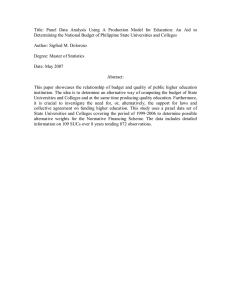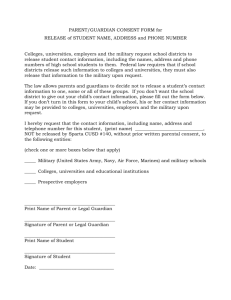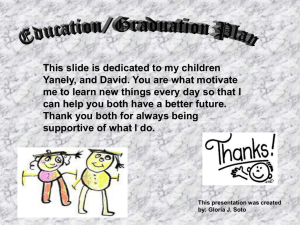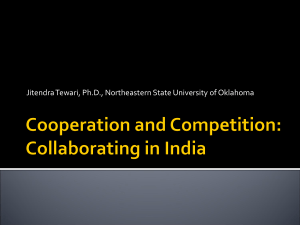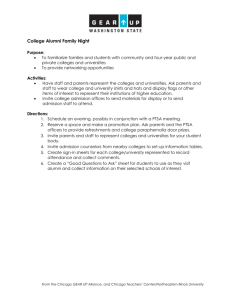Religion & the Academy: A Brief History
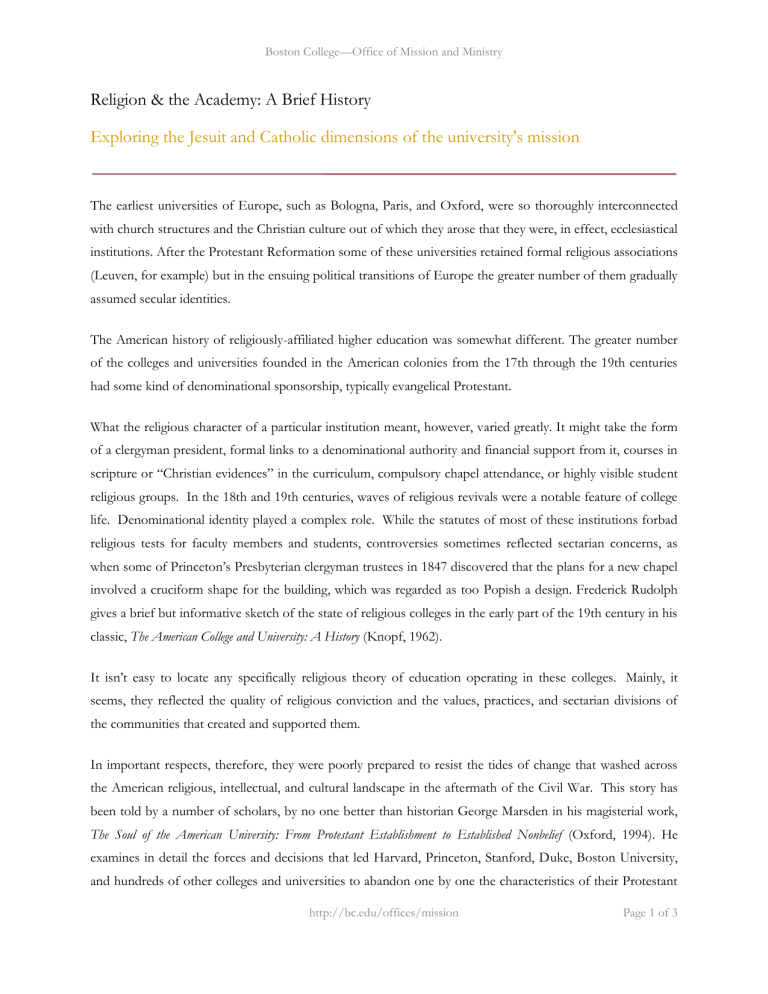
Boston College—Office of Mission and Ministry
Religion & the Academy: A Brief History
Exploring the Jesuit and Catholic dimensions of the university's mission
The earliest universities of Europe, such as Bologna, Paris, and Oxford, were so thoroughly interconnected with church structures and the Christian culture out of which they arose that they were, in effect, ecclesiastical institutions. After the Protestant Reformation some of these universities retained formal religious associations
(Leuven, for example) but in the ensuing political transitions of Europe the greater number of them gradually assumed secular identities.
The American history of religiously-affiliated higher education was somewhat different. The greater number of the colleges and universities founded in the American colonies from the 17th through the 19th centuries had some kind of denominational sponsorship, typically evangelical Protestant.
What the religious character of a particular institution meant, however, varied greatly. It might take the form of a clergyman president, formal links to a denominational authority and financial support from it, courses in scripture or “Christian evidences” in the curriculum, compulsory chapel attendance, or highly visible student religious groups. In the 18th and 19th centuries, waves of religious revivals were a notable feature of college life. Denominational identity played a complex role. While the statutes of most of these institutions forbad religious tests for faculty members and students, controversies sometimes reflected sectarian concerns, as when some of Princeton’s Presbyterian clergyman trustees in 1847 discovered that the plans for a new chapel involved a cruciform shape for the building, which was regarded as too Popish a design. Frederick Rudolph gives a brief but informative sketch of the state of religious colleges in the early part of the 19th century in his classic, The American College and University: A History (Knopf, 1962).
It isn’t easy to locate any specifically religious theory of education operating in these colleges. Mainly, it seems, they reflected the quality of religious conviction and the values, practices, and sectarian divisions of the communities that created and supported them.
In important respects, therefore, they were poorly prepared to resist the tides of change that washed across the American religious, intellectual, and cultural landscape in the aftermath of the Civil War. This story has been told by a number of scholars, by no one better than historian George Marsden in his magisterial work,
The Soul of the American University: From Protestant Establishment to Established Nonbelief (Oxford, 1994). He examines in detail the forces and decisions that led Harvard, Princeton, Stanford, Duke, Boston University, and hundreds of other colleges and universities to abandon one by one the characteristics of their Protestant http://bc.edu/offices/mission Page 1 of 3
Boston College—Office of Mission and Ministry
Christian identity and become the largely secular institutions that we know today. It is a fascinating story, which many readers took as grim warning that the remaining religiously affiliated institutions would not resist the same forces. See reviews of Marsden's book by J.A. Appleyard , Stanley Hauerwas , and Alan Wolfe .
Many forces shaped this transformation but arguably the most powerful and long lasting has been the influence of empirical methods of investigation, first in the natural sciences and then in the social sciences and humanities. A brief but illuminating study of this development— The Sacred and the Secular University by Jon
H. Roberts and James Turner (Princeton University Press, 2000)—argues that between the end of the Civil
War and the beginning of World War I empirical methods of studying both the sciences and the humanities effectively dissolved the Protestant framework of learning by introducing a new secularized curriculum.
In recent years there has been no shortage of books lamenting the loss of liberal or humanistic or valuescentered education in American colleges and universities. The granddaddy of these might be Allan Bloom’s
The Closing of the American Mind: How Education Has Failed Democracy and Impoverished the Souls of Today’s Students
(Simon & Schuster, 1987), but Bloom has had notable successors in former Harvard and Yale deans Harry R.
Lewis - Excellence Without A Soul: Does Liberal Education Have a Future (Public Affairs, 2006) - and Anthony T.
Kronman - Education’s End: Why Our Colleges and Universities Have Given Up on the Meaning of Life (Yale
University Press, 2007).
A characteristic of these books is that the notion of “soul” in them connotes a number of attractive qualities
(virtue, responsible relationships, moral values, civic-mindedness) but none that is specifically identifiable as religious. The books represent the body of thought, perhaps the very large body of thought, that holds that a theory of education can no longer take seriously the idea that human existence is meaningfully enriched by a belief in God.
There has, however, been another broad stream of contemporary thought among Protestant theorists about the religious foundations of education. If nineteenth-century Protestant higher education lacked much of a theological foundation and more or less reproduced in its colleges the values and practices of their founding denominations, there has been a considerable effort in recent years to supply the missing theory. Books such as Mark R. Schwehn’s Exiles from Eden: Religion and the Academic Vocation in America (Oxford University Press,
1993) and Douglas Sloan’s Faith and Knowledge: Mainline Protestantism and American Higher Education
(Westminster John Knox Press, 1994) are two of many examples.
Evangelical Christian institutions have recently become involved in the debate about the role of faith in the university. Mark Noll stirred up the waters with his book, The Scandal of the Evangelical Mind (Grand Rapids:
Eerdmans, 1994). Two recent articles by James Turner (" Something to be Reckoned With ", Commonweal , http://bc.edu/offices/mission Page 2 of 3
Boston College—Office of Mission and Ministry
January 15, 1999) and Alan Wolfe, (" The Opening of the Evangelical Mind ", The Atlantic Monthly, October,
2000) take issue with Noll's views. Another article (" Resisting Secularization ", New Oxford Review , December,
1995) by David Solomon points to the lessons Baylor and Notre Dame can learn from each other about the drift towards secularization.
Two good books explore the range of religiously affiliated colleges and universities and the models they offer.
One is by Robert Benne, Quality With Soul: How Six Premier Colleges and Universities Keep Faith with Their Religious
Traditions (Grand Rapids: Eerdmans Publishing Co., 2001). Another is Models for Christian Higher Education:
Strategies for Success in the Twenty-First Century , by Richard T. Hughes and William B. Adrian (Grand Rapids:
Eerdmans Publishing Co., 1997).
Catholic higher education, of course is a topic we shall address in more detail in another section of this web site.
Finally, to round out this overview of religion and the academy, we should take note of voices arguing that religion should play a positive role in the intellectual life of any university, not just of institutions that espouse an explicit religious identity. This was Newman’s view, of course, and it is ably recapitulated as part of
Jaroslav Pelikan’s thoughtful analysis, The Idea of the University: A Reexamination (Yale University Press, 1992).
Alan Wolfe, director of the Boisi Center for Religion in American Life at Boston College argues in several articles, such as " Higher Learning " ( Lingua Franca , March-April, 1996, 70-77) and " A Welcome Revival for the
Academy ," ( Chronicle of Higher Education , September 19, 1997, B4-B5), for the distinctive contribution that religiously oriented views of human experience make to the dialogue of viewpoints the university is home to.
Another academic who has written on the gap that results from eliminating religion from our analysis of public issues is Georgetown's Joshua Mitchell (" Of Answers Ruled Out ," Academe 82:6, November-
December, 1996).
Today, there are some 268 Catholic colleges and universities in the U.S. and several hundred institutions affiliated in varying degrees with Protestant denominations. There are also a small number of Jewish institutions of higher education and a sprinkling of institutions affiliated with other religious groups. But the total of institutions of higher education in the U.S. is more than 6,500, so religiously affiliated ones still constitute a relatively small percentage of the whole. http://bc.edu/offices/mission Page 3 of 3
